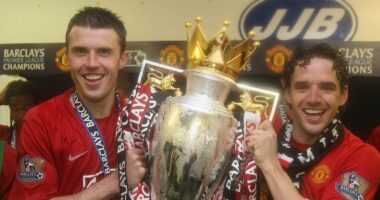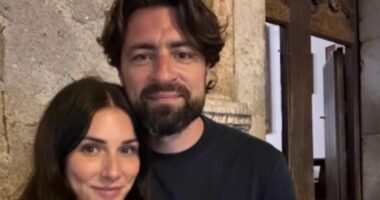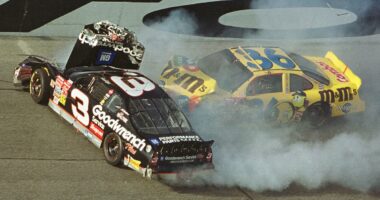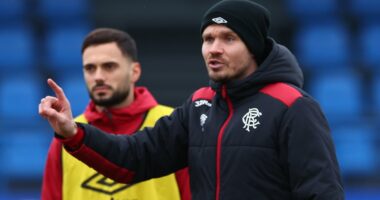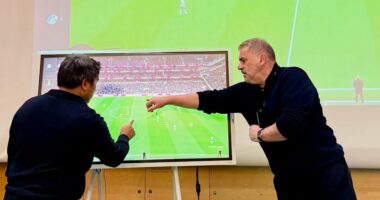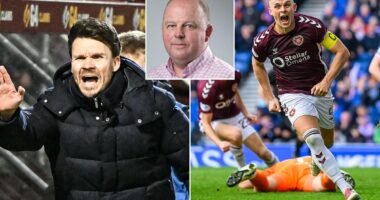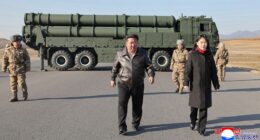Share this @internewscast.com
It was his last messages to them which Terry Newton’s Wigan Warriors team-mates went back to, desperately looking for some sign they might have missed that the big, generous, irrepressible rugby league player they had come to love was about to take his own life.
He’d texted prop Terry O’Connor, to say that after rugby league he was considering a ‘career in crime’. That seemed so typically Newton, always on the end of a phone with a joke, but was this, in retrospect, a veiled message expressing desperation at the ending of a gilded career? He had offered to sell a watch to another team-mate, who afterwards asked himself the same question. Had it really come to this?
They’d read nothing into any of his words because Newton – ‘Tez’ to one and all – was so irrepressible and full of life. The man who would abruptly end phone calls with you from the car ‘when he was bored with you’ by saying ‘got to go, the police are behind me!’
The last words Chris Brookes, another friend, exchanged with him were on the afternoon of the day before Newton’s body was found. The rugby league warrior Newton knew from the British team ranks told him he was running around Wigan on errands in his new role running a pub, the ‘Ben Johnson’ on the outskirts of Wigan, with his father-in-law. There was some beer and auction prizes to pick up for a fundraiser they were staging. That was some comedown.
‘There were no signs, no real alerts,’ says Brookes, the GM team doctor, and now a professor of medicine and Wigan Warriors chairman, whom Newton looked after and ensured was welcomed when he nervously entered the national set-up.

Terry Newton, who took his own life 15 years ago, playing for Wigan Warriors in 2005

Wigan Warriors team-mates of Newton address the current squad on the need to look for signs that one of their number is struggling
It is 15 years next week since Newton’s body was found in the loft of his home in Wigan and his team-mates joined the current Warriors squad last week to ask them whether they would know if one of their own number was struggling in the way that Newton was.
Today is National Suicide Prevention Day and Warriors have opened a community garden at their training ground, which they want to become a space where the kind of open conversations can happen which Newton never felt able to have.
The all-conquering side’s coach, Matt Peet, is an elite operator and serial winner, who has taken Warriors to two Super Leagues, two Challenge Cups and a World Club Challenge since taking the helm four years ago. But after hearing Newton’s old team-mates address the squad, he tells his players that they are no more immune from psychological struggle than Newton was. That their careers in sport are painfully brief. That they must look and listen for the signs that one in their number is struggling.
‘I do not care if we don’t win or don’t take another f***ing trophy,’ he tells the team meeting. This is the most important thing. Looking after one another.’ You can hear a pin drop in the room, as he speaks.
Warriors have invited me here into their inner sanctum to witness this because they want the message about looking for the signs of struggle, in men – particularly – to extend beyond their ranks and out into the town they represent.
Wigan has the highest male suicide rate in Britain – in part, a consequence of the difficult lives that many have known amid the town’s economic struggles.
The council has had its budget cut by 43 percent, the third-worst affected local authority in England. There is a lower than average life expectancy and as many as 23,000 children living in child poverty. Loneliness is a common problem, particularly among young men: 15 percent of men in the town say they have no close friendships or anyone to confide in.
The morning’s reflection, set amid training sessions, includes the squad meeting people from the town who know all too well the same experience of finding one of their own has taken their own life.

The Wigan Warriors squad gather in a moment of contemplation. ‘Looking out for each other is more important than winning trophies,’ coach Matt Peat told them

Warriors half-back Harry Smith adds his message to the wall in the garden at the club’s training ground which is place for contemplation

Newton’s father, Tony, discusses his son with Warriors coach Peet. ‘My son had changed but I saw no signs that he would take his life,’ he says
Nina Smith’s brother Will died in the same way in 2021. ‘He was a successful site manager but we knew he was struggling,’ she tells me. ‘But we didn’t know what to say to really make a difference.’ Nina, a teacher, has subsequently worked on a Department of Education project training staff in school in hope to spot profound anxiety and mental turmoil in children.
The hope is that the Warriors’ example will encourage those in a town where the rugby league and football teams are a spiritual core to look out for each other. ‘Take what you have out into the town,’ Brian Carney, another of Newton’s team-mates, tells Peet’s squad meeting. ‘Do what you can to push the message out.’
Brookes, universally known around the club as ‘the Doc’ reflects on how there was, or course, an enormous reason why Newton would have been struggling.
In 2009, his younger sister, Leanne, died at the age of 30 after becoming addicted to heroin. The following year, an out-of-season drugs test found that he had been taking a banned human growth hormone to prolong his career at Wakefield Trinity. He was banned for two years and his career ended in ignominy.
The opening chapter of Newton’s ghost-written autobiography, published soon after the ban and rewritten to include it, is one of the most searing I can recall. Newton lays bare the excruciating reality of having to tell his wife, Stacey, from whom he later separated, and his parents. The tone of the book is ultimately upbeat. Even in his own, unexpurgated memoir, there are no material signs. Within months of its publication, he was dead.
The rugby league club want its community garden to bring something lasting out of their warrior’s death. It includes a wall on which visitors are encouraged to write messages of encouragement which might change a life. Newton’s father Tony arrives to write his own.
‘Looking back, there were little subtle changes in my boy,’ he tells me. ‘He would visit us less. He was quieter. Rugby players are big men, with big shoulders, but even they can’t carry the weight of the world on their own or deal with an illness like depression. “Could I have done something? Could I have stopped him taking his life?” There’s not a day goes by when it doesn’t cross my mind.’
The Warriors’ short film of their day of reflection on YouTube.

